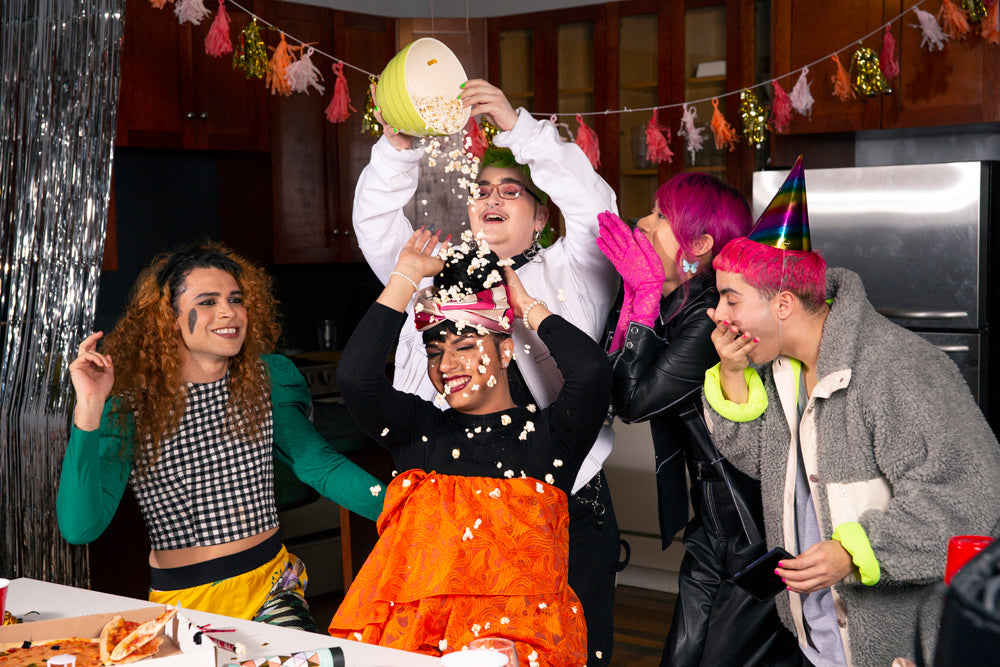
"But I Don't Bleed!" Honoring Your Cycles For People Without Uteruses
Guest BloggerNot to state the obvious, but not everyone has a uterus. Whether your uterus was removed by choice or circumstance, or you were born without one for one reason or another, many people don’t have uteruses, and many of those people are still women or identify with the feminine. Everyone, including cisgender men, trans women, non-binary people without uteruses, and people who’ve had hysterectomies all still experience physical and emotional cycles. Finding ways to connect to and honor those cycles may be healing even if you don’t experience a menstrual cycle.
Below are some suggestions on how to honor your cycles, particularly if you do not have a uterus.
Celebrate your body, as it is and as it has been. Whether you feel young or old, your body already has quite the history. Learn about your body; study your physical form. You might want to create a timeline of important events and experiences that your body has been through, whether it’s your own birth, surgeries, transitions, illnesses, recoveries, parenting other humans, or anything else that feels significant. Connect with your body, through activities like sex, movement, and eating. Notice what your body needs and wants, and how that varies from day-to-day, minute-to-minute. These variations themselves are a cycle of fluctuations that may be universal and at the same time unique to you.
Learn about the cycles you are experiencing. All living bodies are constantly cycling, whether they are menstruating or not. Two cycles that all of us experience are the daily cycle and the moon cycle. Every 24 hours, through movements of the sun, moon, and earth, we experience a cycle that moves us through midnight, morning, afternoon, evening, and back again. These time periods parallel the menstrual cycle, with midnight feeling similar to a period bleed, dawn feeling similar to the follicular phase, noon paralleling ovulation, and dusk mirroring the luteal phase. The moon cycle is a 28 day cycle that also has similar phases to the menstrual cycle: beginning with a new moon (menstruation/period), the moon waxes into a quarter moon (follicular phase), then full moon (ovulation), and finally wanes into another quarter moon (luteal phase) as it rotates towards the next new moon. People with penises also experience cyclical hormonal cycles, with higher testosterone levels in the mornings that taper off as the day goes on. You can read more about the menstrual cycle here, and think about other cycles that you experience that may parallel.
Create rituals around cycles. Just because you don’t have a uterus or menstruate does not mean that you don’t also need rest and release, that you aren’t also experiencing times of heightened creativity, libido, or extroversion. Consider the cycles you are experiencing and brainstorm rituals around those cycles that would feel good to you. Since the 28 day moon cycle is the same length as the average menstrual cycle, following the moon cycle as your main cycle can be helpful. Perhaps you give yourself some extra rest around the new moon, and schedule an exciting trip or hot date around the full moon. You could eat your favorite chocolate and head to bed early on the new moon and plan some extra fun sex—with yourself or partners—around the full moon. The possibilities are endless; get creative about what works for you.
Remember that you’re worth honoring. In case you need a reminder: your organs are just that, organs. Your body, your gender, your personhood are amazing and deserve honoring, at every stage of every cycle. You don’t need a uterus to track, honor, and live according to your cycles. Whether you choose to honor the cycles you’ve experienced throughout your lifetime, the daily cycle, the moon cycle, or one of the many other cycles we experience, it is importnat to remember that you—a cyclical being—are worth honoring.
Whether you no longer have a uterus or never had one to begin with, your body is an amazing, cyclical organism and there are many cycles that you experience. Learning more about your cycles and choosing to honor them can support your embodiment, mental health, and more.
Beth Rich is a queer educator and lifespan doula who works at the thresholds and intersections of menstruation, family-building, pregnancy, birth, loss, and other life transitions. They are a non-binary human who's excited to talk about bodies, periods, birth, and sex in language that holds space for all of us. Discover more of their work at thebethrich.com or on Instagram @thebethrich.




